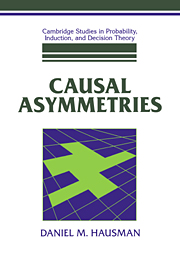Book contents
- Frontmatter
- Contents
- List of Figures
- Acknowledgments
- Introduction: Causation and its Asymmetries
- 1 Metaphysical Pictures and Wishes
- 1* Transfer Theories
- 2 Is Causation a Relation Among Events?
- 3 Causation, Regularities, and Time: Hume's Theory
- 4 Causation and Independence
- 4* Causation, Independence, and Causal Connection
- 5 Agency Theory
- 5* Causal Generalizations and Agency
- 6 The Counterfactual Theory
- 6* Independence and Counterfactual Dependence
- 7 Counterfactuals, Agency, and Independence
- 7* Agency, Counterfactuals, and Independence
- 8 Causation, Explanation, and Laws
- 8* Causation, Explanation, and Independent Alterability
- 9 Probabilistic Causation
- 10 Causation and Conditional Probabilities
- 10* Causal Graphs and Conditional Probabilistic Dependencies
- 11 Intervention, Robustness, and Probabilistic Dependence
- 11* Interventions and Conditional Probabilities
- 12 Operationalizing and Revising the Independence Theory
- 12* Probability Distributions and Causation
- 13 Complications and Conclusions
- Appendix A Alphabetical List of Propositions
- Appendix B List of Theorems
- References
- Index
5* - Causal Generalizations and Agency
Published online by Cambridge University Press: 20 April 2010
- Frontmatter
- Contents
- List of Figures
- Acknowledgments
- Introduction: Causation and its Asymmetries
- 1 Metaphysical Pictures and Wishes
- 1* Transfer Theories
- 2 Is Causation a Relation Among Events?
- 3 Causation, Regularities, and Time: Hume's Theory
- 4 Causation and Independence
- 4* Causation, Independence, and Causal Connection
- 5 Agency Theory
- 5* Causal Generalizations and Agency
- 6 The Counterfactual Theory
- 6* Independence and Counterfactual Dependence
- 7 Counterfactuals, Agency, and Independence
- 7* Agency, Counterfactuals, and Independence
- 8 Causation, Explanation, and Laws
- 8* Causation, Explanation, and Independent Alterability
- 9 Probabilistic Causation
- 10 Causation and Conditional Probabilities
- 10* Causal Graphs and Conditional Probabilistic Dependencies
- 11 Intervention, Robustness, and Probabilistic Dependence
- 11* Interventions and Conditional Probabilities
- 12 Operationalizing and Revising the Independence Theory
- 12* Probability Distributions and Causation
- 13 Complications and Conclusions
- Appendix A Alphabetical List of Propositions
- Appendix B List of Theorems
- References
- Index
Summary
Token and Type Causation
How should one interpret claims that a property A, a variable x, or kind of event a is a cause of another? In chapter 2,1 argued that cause and effect are events. Since properties, variables, and kinds are not events, they cannot be causes or effects. Either they stand in some different kind of causal relation, or the truth of the claim that a causes b derives from the causal relations obtaining among tokens. My view is that claims concerning causal relations among types, properties, and variables are generalizations concerning causal relations among tokens.
Many authors have held, in contrast, that there are two varieties of causation, one relating tokens and the other relating types. Peter Menzies, for example, writes, “What kinds of entities do causal sentences relate? This question is readily answered in the case of general causation, since a distinguishing mark of a general causal sentence is that its causal relata are properties. The question is much harder to answer in the case of singular causation” (1989b, p. 59). In Probabilistic Causality (1991), Ellery Eells develops different theories of “type-level” and “token-level” causation. Eells argues extensively for countenancing two distinct kinds of causation, and I will accordingly focus on his case (see also Sober 1985, 1986).
Eells presents his argument for the existence of a distinct type-level causal relation in the context of a theory of probabilistic causation, and some of his concerns cannot be addressed until §9.2.
- Type
- Chapter
- Information
- Causal Asymmetries , pp. 99 - 110Publisher: Cambridge University PressPrint publication year: 1998
- 1
- Cited by

